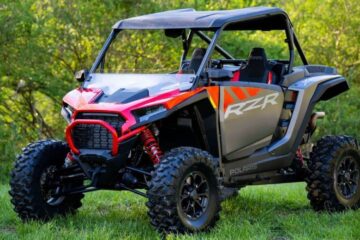Most people consider buying a vehicle a milestone, a reflection of hard work and personal achievement. It’s no surprise, then, that some owners choose to modify their cars, whether to boost performance, express personality, or simply stand out on the road.
However, car mods can also come with hidden risks. Sometimes, they lead to persistent mechanical issues, lower the car’s value, or even contribute to serious accidents.
If you are considering customizing your vehicle, it is essential to understand how certain modifications can affect safety and performance, and what your options are if those changes lead to complications like a crash.
What Is a Car Modification?
A car modification is any alteration in your vehicle’s original factory design for several purposes, such as:
- For improved performance
- For style and lifestyle
- To make the vehicle feel more like you,
Unfortunately, even minor tweaks can lead to big consequences. That bold new mod could unexpectedly affect your vehicle’s safety, raise red flags with your insurer, or, even worse, land you in legal hot water if it violates regulations.
Loving your car means knowing the risks. Because the mods that set you apart shouldn’t be the reason you’re left unprotected when something goes wrong.
Is Modifying a Car Illegal in California?
Customizing a vehicle is legal in California. However, drivers must understand and follow specific California car modification laws when doing so.
Vehicle Height and Suspension
California has clear rules about how much you can lift your car. A body or suspension lift can’t go over 5 inches, and there’s a maximum frame height based on your car’s weight:
| Vehicle Weight (GVWR) | Max Frame Height |
| Under 4,500 lbs | 27 inches |
| 4,501–7,500 lbs | 30 inches |
Engine and Exhaust Mods
Dreaming of more power under the hood? Be careful. Any engine or exhaust modification must meet California’s strict emissions laws. Here’s what that means:
- Aftermarket parts must have a CARB Executive Order (EO) number.
- Mufflers are required, but they must not make your car too loud. California sets a limit on how much noise your exhaust can make.
- Rolling coal, deliberately blowing thick black smoke, is also illegal.
Note that non-compliant exhaust mods can fail smog tests and lead to steep fines.
Tints and Body Work
While tinted windows look sleek and keep interiors cool, the law limits how dark they can be. In California:
- Front side windows must let in at least 70% of light.
- The total height of your vehicle, including lifts, can’t exceed 14 feet.
Lighting and Sound: Bright, Not Blinding
Lighting mods must keep everyone safe on the road:
- Headlights can’t be too bright or misaligned.
- Sound systems shouldn’t disturb other drivers or neighborhoods.
What Happens If I Fail to Follow the California Car Modification Laws?
Making the wrong kind of car mod can come with real consequences. Here is what you might face:
| Violation | Potential Fine | Other Consequences |
| Loud exhaust | Up to $1,000 | Must fix the issue |
| Illegal window tint | $25 base + added fees | Removal required |
| Unauthorized engine changes | Varies | Smog failure, registration issues |
Insurance companies may also raise your rates or cancel your policy altogether if your car is seen as unsafe or unlawfully modified.
Moreover, if your vehicle is under 6,000 pounds and built after 1975, it must pass a smog check every two years or when it changes ownership.
If authorities suspect illegal mods, they can refer your car for a state inspection. You may need to:
- Submit a “Statement of Construction”
- Provide brake and lighting certificates
- Make repairs to pass or risk having your registration revoked
If your car fails smog checks due to excessive emissions, it may be labeled a “gross polluter.” This can seriously affect your ability to register, resell, or legally drive your car.
Most Common Car Modifications and Their Dangers on the Road
If you are planning to modify your car, here are the most common customization options and their possible impact on safety, performance, and durability.
Suspension and Drop Bracket Lift Kit
Planning to lift your ride? Suspension modifications are among the most common and dramatic ways to transform a vehicle’s look and performance, but they come with serious trade-offs.
A suspension lift kit gives your car or truck a taller, more commanding stance by modifying essential components like control arms, coil springs, shocks, and sometimes leaf springs (especially in trucks and SUVs). It is a favorite among off-roaders who want to clear rocky terrain and mud easily. Plus, it makes room for larger tires, delivering better traction and that rugged, aggressive style many drivers love.
In contrast, a drop bracket lift kit (also called a spacer or subframe drop kit) works a little differently. Instead of lifting everything, it lowers the mounting points of your suspension components in relation to the frame. This type of lift is ideal for vehicles with independent front suspension (IFS) because it keeps crucial elements like steering and drivetrain geometry close to factory specs, helping preserve performance and prevent early wear and tear.
Can the Suspension Mod Cause Accidents?
Yes, suspension modifications can cause accidents.
When done carelessly or without proper know-how, they can drastically change how your vehicle handles, brakes, and responds in emergencies. What starts as a visual upgrade could lead to:
- Unstable handling from a higher center of gravity
- Longer stopping distances if brakes aren’t upgraded
- Alignment or steering issues from altered suspension geometry
- Even a sudden part failure may occur if low-quality components are used
Lighting Mods
Lighting modifications refer to changes made to a vehicle’s factory-installed lighting system to alter its appearance, brightness, function, or color.
For many car enthusiasts, lighting mods are a form of self-expression. Lighting mods can add serious personality to your ride, whether it is a sleek LED headlight conversion, a bold underglow, or custom taillights that make your vehicle stand out at night.
For some, on the other hand, lighting mods help increase visibility on the road, which helps improve road safety. Some lighting mods include:
- LED or HID headlight conversions
- Custom headlight assemblies
- Underglow lighting
- Aftermarket taillights and sequential turn signals
- Interior light kits
- Off-road light bars
When Is the Lighting Mod Illegal and Dangerous?
Lhgitng mods become illegal and dangerous when they cause the following:
- Blinding Oncoming Drivers: Overly bright or poorly aligned headlights can cause momentary blindness and serious crashes.
- Confusing Colors: Blue, red, or strobing lights can be mistaken for emergency vehicles. In California, using them is strictly prohibited.
- Increased Insurance Risk: Illegal modifications can lead to citations and may even affect your insurance coverage or claims if you’re involved in a crash.
Aftermarket Wheels and Tires
Tires are among a vehicle’s most crucial components. When tires expire, drivers must ensure they are replaced to avoid tread separation, cracking, dry rot, and loss of grit and traction.
For some, having aftermarket wheels and tires can elevate their vehicle’s look and performance. However, if you choose the wrong size, you sabotage your safety.
Can the Wrong Wheels or Tires Put Me in Danger?
Choosing the wrong wheels or tires might seem like a harmless tweak, but it can turn into a real danger on the road.
- Loss of Control: An ill-fitting tire or rim doesn’t just affect looks—it can throw off your steering and braking in critical moments. One wrong-size upgrade could mean the difference between avoiding a crash and losing control entirely.
- Premature Wear: Go too big or too small, and your vehicle’s suspension, brakes, and drivetrain pay the price. Misaligned stress points lead to faster wear, more frequent repairs, and unexpected breakdowns, often when you can least afford them.
- Speedometer Inaccuracy: Larger or smaller tires can cause your speedometer and odometer to give false readings, which may affect your ability to follow speed limits safely.
- Increased Blowout Risk: Tires that don’t match your vehicle’s load or speed rating can overheat and fail, especially at high speeds or during hot California summers.
ECU Remapping or Tuning
Your car’s Engine Control Unit (ECU) is its brain. It controls how much fuel and air mix in the engine, when to ignite that mix, how power is delivered, and much more. ECU remapping, also called “tuning,” involves reprogramming this ECU to change how the engine performs.
Drivers often remap the ECU to:
- Increase horsepower and torque
- Improve throttle response
- Enhance fuel efficiency
- Remove factory speed limiters
How Can Improper ECU Tuning Cause Crashes?
Many drivers don’t realize that tuning the ECU, especially without proper calibration, can upset the delicate balance of the vehicle’s powertrain and safety systems. That imbalance can lead to dangerous consequences, including:
- Power Imbalance: Stock brakes, tires, and suspension are not always designed to handle extra power. This mismatch can make acceleration unpredictable, cause wheelspin or fishtailing, or compromise cornering control.
- Braking Failure: More power = higher speeds = greater need for stopping force. However, if your ECU has been tuned for performance without upgrading your brakes, you may find longer stopping distances, brake fade (loss of braking power during repeated or prolonged use), and premature brake wear.
Does Insurance Cover Car Accidents that Involve Cars with Modifications?
Yes, insurance can cover car accidents involving modified cars, but coverage depends on several critical factors. If you are not careful, your claim could be partially paid, denied, or voided altogether.
Insurance can cover the damages if:
- Modifications are disclosed: If you told your insurer about the mods before the accident, and they accepted the risk, you are likely covered, though maybe at a higher premium.
- Mods are street-legal and professionally installed: Changes that meet safety and legal standards are more insurable.
- You have a specialized policy: Some insurers offer modified car policies designed for vehicles with aftermarket upgrades, including coverage for the value of the modifications.
Drivers may face serious legal and financial consequences if a modification contributes to a crash. In auto crashes involving cars with modifications, you may experience complications in your claim, such as:
- Insurers can deny your case.
- Liability may shift to you.
- Law enforcement could issue citations for non-compliance with state regulations.
Having the right legal support can significantly benefit you in these complex situations. A car accident lawyer can help protect your rights, challenge denied insurance claims, and determine whether liability can be reduced or shared.
If your vehicle mods led to an accident or someone else’s illegal upgrade put you at risk, consulting a legal professional can help manage your case and seek fair compensation.




